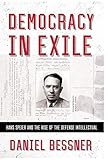Democracy in Exile : Hans Speier and the Rise of the Defense Intellectual / Daniel Bessner.
Material type: TextSeries: The United States in the WorldPublisher: Ithaca, NY : Cornell University Press, [2018]Copyright date: 2018Description: 1 online resource (312 p.) : 12 b&w halftones, 1 chartContent type:
TextSeries: The United States in the WorldPublisher: Ithaca, NY : Cornell University Press, [2018]Copyright date: 2018Description: 1 online resource (312 p.) : 12 b&w halftones, 1 chartContent type: - 9781501709395
- Exiles -- Germany -- Biography
- National security -- United States -- History -- 20th century
- Sociologists -- Germany -- Biography
- Sociologists -- United States -- Biography
- Biography & Autobiography
- Political Science & Political History
- U.S. History
- BIOGRAPHY & AUTOBIOGRAPHY / Social Scientists & Psychologists
- expertise, foreign relations, RAND corporation, Cold War, propaganda
- 301.092 B 23
- HM479.S
- HM479.S
- online - DeGruyter
| Item type | Current library | Call number | URL | Status | Notes | Barcode | |
|---|---|---|---|---|---|---|---|
 eBook
eBook
|
Biblioteca "Angelicum" Pont. Univ. S.Tommaso d'Aquino Nuvola online | online - DeGruyter (Browse shelf(Opens below)) | Online access | Not for loan (Accesso limitato) | Accesso per gli utenti autorizzati / Access for authorized users | (dgr)9781501709395 |
Browsing Biblioteca "Angelicum" Pont. Univ. S.Tommaso d'Aquino shelves, Shelving location: Nuvola online Close shelf browser (Hides shelf browser)

|

|

|

|

|

|

|
||
| online - DeGruyter Thinking beyond the State / | online - DeGruyter The Control Agenda : A History of the Strategic Arms Limitation Talks / | online - DeGruyter Raised under Stalin : Young Communists and the Defense of Socialism / | online - DeGruyter Democracy in Exile : Hans Speier and the Rise of the Defense Intellectual / | online - DeGruyter Resurrecting Nagasaki : Reconstruction and the Formation of Atomic Narratives / | online - DeGruyter Over the Horizon : Time, Uncertainty, and the Rise of Great Powers / | online - DeGruyter Protest Politics in the Marketplace : Consumer Activism in the Corporate Age / |
Frontmatter -- Contents -- Preface -- Acknowledgments -- Introduction. Democracy, Expertise, and U.S. Foreign Policy -- Chapter 1. Masses and Marxism in Weimar Germany -- Chapter 2. The Social Role of the Intellectual Exile -- Chapter 3. Public Opinion, Propaganda, and Democracy in Crisis -- Chapter 4. Psychological Warfare in Theory and Practice -- Chapter 5. The Making of a Defense Intellectual -- Chapter 6. The Adviser -- Chapter 7. The Institution Builder -- Chapter 8. Social Science and Its Discontents -- Conclusion. Speier, Expertise, and Democracy after 1960 -- Abbreviations -- Archival and Source Abbreviations -- Notes -- Archives Cited -- Index
restricted access online access with authorization star
http://purl.org/coar/access_right/c_16ec
Anyone interested in the history of U.S. foreign relations, Cold War history, and twentieth century intellectual history will find this impressive biography of Hans Speier, one of the most influential figures in American defense circles of the twentieth century, a must-read.In Democracy in Exile, Daniel Bessner shows how the experience of the Weimar Republic’s collapse and the rise of Nazism informed Hans Speier’s work as an American policymaker and institution builder. Bessner delves into Speier’s intellectual development, illuminating the ideological origins of the expert-centered approach to foreign policymaking and revealing the European roots of Cold War liberalism.Democracy in Exile places Speier at the center of the influential and fascinating transatlantic network of policymakers, many of them German émigrés, who struggled with the tension between elite expertise and democratic politics. Speier was one of the most prominent intellectuals among this cohort, and Bessner traces his career, in which he advanced from university intellectual to state expert, holding a key position at the RAND Corporation and serving as a powerful consultant to the State Department and Ford Foundation, across the mid-twentieth century. Bessner depicts the critical role Speier played in the shift in American intellectual history in which hundreds of social scientists left their universities and contributed to the creation of an expert-based approach to U.S. foreign relations, in the process establishing close connections between governmental and nongovernmental organizations. As Bessner writes: to understand the rise of the defense intellectual, we must understand Hans Speier.
Mode of access: Internet via World Wide Web.
In English.
Description based on online resource; title from PDF title page (publisher's Web site, viewed 26. Aug 2024)


